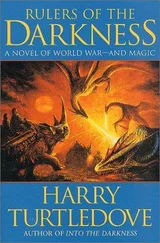“Oh!” Pekka muttered something worse than Oh! under her breath. “There goes the caravan. Now we’ll have to wait a quarter of an hour for the next one.”
“At least we’ll be out of the rain,” Leino said. Every caravan stop in Kajaani—so far as Pekka knew, every stop in Kuusamo—was roofed against rain and sleet and snow. The stops wouldn’t have been worth having if they weren’t.
A news-sheet vendor was taking advantage of the shelter when Pekka and Leino came in to get out of the wet. He waved a sheet at them, saying, “Want to read about the ultimatum Swemmel of Unkerlant has handed Zuwayza?”
“Something unfortunate should happen to Swemmel of Unkerlant,” Leino said. That didn’t keep him from handing the vendor a couple of square copper coins and taking a sheet. He sat down on a bench, Pekka beside him.
They read together. Pekka’s eyebrows rose. “Swemmel doesn’t ask for much, does he?” she said.
“Let’s see.” Leino ran his hand down the page. “All the border fortifications, all the power points halfway from the border to Bishah, the right to base a fleet at the harbor of Samawa—and to have the Zuwayzin pay for it. No, not much: not much he deserves, I mean.”
“And all that on pain of war if Zuwayza refuses,” Pekka said sadly. “If he were an ordinary man instead of a king, he’d be up before a panel of judges on extortion charges.”
Leino had read a little more than she had. “Looks like another war, sure enough. Here, see a crystal report from Bishah quotes their foreign minister as saying that yielding to an unjust demand is worse than making one. If that doesn’t sound like the Zuwayzin intend to fight, I don’t know what does.”
“I wish them well,” Pekka said.
“So do I,” her husband answered. “The only thing I’m sorry about is that, if they’d given in, Swemmel might have gone back to war with Gyongyos. As is, the Gongs are only fighting us, and that makes them tougher.”
“If a few islands out in the Bothnian Ocean were in different places, if a few ley lines ran in different directions, we’d have no quarrel with Gyongyos,” Pekka said.
“Gyongyos would probably have a quarrel with us, though,” Leino answered. “The Gongs enjoy fighting, seems like.”
“I wonder what they say about us,” Pekka said in musing tones. Whatever it was, it did not appear in the Kajaani Crier or any other Kuusaman news sheet.
A caravan hummed up to the stop. The conductor opened the door. A couple of people in hats and capes got off. Pekka preceded Leino up the steps and into the car. They both plopped eight-copper silver bits in the fare box. Nodding, the conductor waved them back to the seats, as if it were only through his generosity that they had so many from which to choose.
As the caravan began to move, Pekka said, “My grandmother said that, when she was a little girl, her grandmother told her how frightened she was when she was a little girl, the first time she got up on the step to go into a ley-line caravan. There it was, floating on nothing, and she couldn’t see why it didn’t fall down or tip over.”
“Can’t expect a child to understand the way complex sorceries work,” Leino answered. “For that matter, back in those days ley lines were a new thing in the world, and nobody understood them very well—though people thought they did.”
“People always think they know more than they do,” Pekka said. “It’s one of the things that make them people.”
They got off at the road that led up to their house. No butterflies flitted now. No birds sang. Rain fell. Rain dripped from trees. Wet branches slapped them in the face as they slogged uphill to pick up Uto from Pekka’s sister.
When Elimaki came to the door, she looked harried. Uto, on the other hand, seemed the picture of innocence. Pekka did not need grounding in theoretical sorcery to know appearances could deceive.
“What did you do?” she asked him.
“Nothing,” he answered sweetly, as he always did.
Pekka glanced to her sister. Elimaki said. “He went climbing in the pantry. He knocked over a five-pound canister of flour, and then tried to tell me he hadn’t. He might have gotten away with it, too, if he hadn’t left a footprint right in the middle of the pile of flour on the pantry floor.”
Leino started to laugh. So did Pekka, in spite of herself. She and her husband weren’t the only ones in the family straying off the beaten track, either. Ruffling Uto’s hair, she said, “You’ll go a long way, son—if we decide to let you live.”
Colonel Dzirnavu was not a happy man. So far as Talsu could tell, Dzirnavu was never a happy man. Like a lot of common people, the Jelgavan count took out his unhappiness on everyone around him. Since he was an officer and a noble, the soldiers in his regiment couldn’t tell him to jump off a cliff, as they surely would have if he’d been a commoner like themselves.
“Vartu!” he shouted one morning—he shouted the way singers went through the scales, to warm up his voice. “Confound it, Vartu, where have you gone and hidden yourself? Get your whipworthy arse into my tent this instant!”
“Confound it, Vartu!” Talsu echoed as Dzirnavu’s servant came by on the dead run. Vartu gave him a dirty look before ducking under the tent-flap and facing his principal’s wrath.
“How may I serve you, my lord?” he asked, his words clearly audible through the canvas.
“How may you serve me?” Dzirnavu bellowed. “How may you serve me? You may get me that rascally cook, that’s how, and serve me his guts for tripe at my luncheon today. Will you look at this? Will you look at this, Vartu? The ham-fisted thumbfingered son of a whore had the gall to serve me a plate of runny scrambled eggs. How in the names of the powers above am I supposed to eat runny scrambled eggs?”
Talsu looked down at his own tin plate, which contained the usual breakfast scoop of mush and the equally usual length of cheap, stale sausage. He glanced over to his friend Smilsu, who was sitting on a rock close by. In a low voice, he asked, “How in the names of the powers above am I supposed to eat runny scrambled eggs?”
“With a spoon?” Smilsu suggested. His breakfast ration was no more prepossessing than Talsu’s.
“I’ve got one of those, sure enough.” Talsu held it up. “Now if I only had some eggs, I’d be in business.”
Smilsu sadly shook his head. “If you’re going to grouse and grumble about every least little thing, my boy, you’ll never get to be a colonel like our illustrious regimental commander.” He set a finger by the side of his nose. “Of course, if you don’t grouse and grumble, you’ll never get to be a colonel, either. You haven’t got the bloodlines for it.”
“Bloodlines are fine, if you’re a horse.” Talsu let his eyes slide toward Count Dzirnavu’s tent. “Or even some particular part of a horse.” Smilsu, who was in the middle of swallowing a mouthful of mush, almost choked to death on it. Talsu went on, “For picking soldiers, though…” Now he shook his head. “If we had real soldiers leading us, we’d be down in Tricarico this time, instead of still slogging our way through these cursed hills.” He snapped his fingers. “I bet that’s why the stinking Algarvians haven’t really counterattacked.”
He’d got a jump ahead of Smilsu. “What’s why?” his friend asked. “What are you talking about?”
Talsu dropped his voice to hardly more than a whisper, so only Smilsu would hear: “If the redheads hit us hard, they’d be bound to kill off a lot of officers. Sooner or later, we’d run out of nobles to take their places. Then we’d have to start using men who knew what they were doing instead. We’d be sure to lick Algarve after that, so they’re just playing it safe and smart.”
Читать дальше












